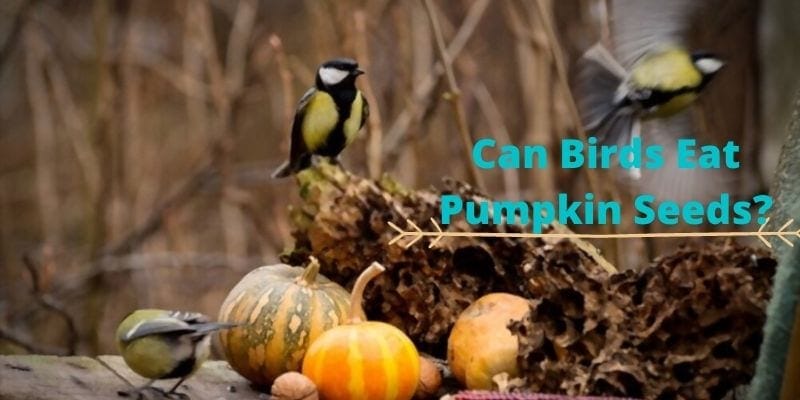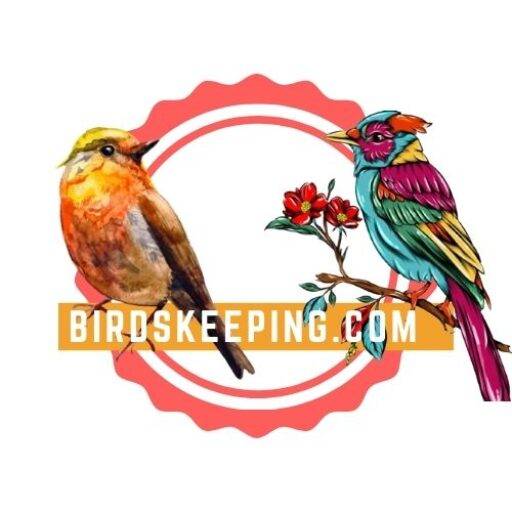Birds are known to eat different types of fruits, vegetables, and insects. You might have seen birds eating chia seeds. Pumpkin seeds are also the topic of discussion among many bird feeders and bird watchers. There is a doubt, can birds eat pumpkin seeds?
The answer to the question is yes, and birds can eat pumpkin seeds. Pumpkin seeds have a lot of healthy nutrients for birds. Read more about feeding pumpkin seeds to birds and how you can do this perfectly.
Table of Contents:
- Do Birds Like Pumpkin Seeds?
- Are Pumpkin Seeds Safe For Birds?
- How To Serve Pumpkin Seeds To Birds?
- Can Birds Eat Raw Pumpkin Seeds?
- Can Garden Birds Eat Pumpkin Seeds?
- Can Birds Eat Roasted Pumpkin Seeds?
- Final Thought
Do Birds Like Pumpkin Seeds?
Yes, birds like eating pumpkin seeds. They have good taste and have various benefits also. Pumpkin seeds are healthy for birds in the autumn, when they need more calories to power transportation, leave the nest in winter and metabolize fat to withstand the cold.

Pumpkin seeds are a decent source of nutrition and are high in carbs, vitamins, and good fats. They’re also high in trace minerals and nutrients essential for a wild bird’s complete diet, such as Calcium, and Cupro-nickel.
It also contains iron and Magnesium (Mg). Due to these factors, it is of many benefits to birds, and they would love to eat these seeds.
Can Birds Eat Safflower Seeds?
Are Pumpkin Seeds Safe For Birds?
Yes, pumpkin seeds are safe for birds. Pumpkin is high in vital protein sources, nutrients, and ions, all of which are good for humans, and it is also very safe for birds because of the same nutrient content.
Pumpkins are high in Omega-3 and Omega-6 fatty acids, and it is important if the bird is growing older and needs to maintain overall health. The most popular source of these fatty acids is fish oil.
Since birds dislike the flavor of fish oil, pumpkins can be a perfectly natural way for them to get this essential nutrient. Vegetable oils make up the rest of the fat composition of pumpkins.
You’ll want to include these fatty acids in your bird’s feed to keep him safe.
For birds to develop musculature and tissues, they must consume sufficient levels of nutrients. Pumpkins are essential to ensure that your bird gets enough nutrition from natural sources.
How To Serve Pumpkin Seeds To Birds?
It is simple to scatter pumpkin seeds for birds to eat, and no special planning is needed. The raw seeds from the pumpkin rind may be placed in a dish or table feeder.
The birds will take care of themselves by scraping off pieces of flesh and eating the seeds. Birds can go to a compost heap in search of juicy curd and chewy seeds. If you want to cook the seeds yourself, rinse them in clean water to extract the pulp.
Roast the cleaned seeds for 20 to 30 minutes at 200 to 300 degrees Fahrenheit (95 to 150 degrees Celsius) on a lightly greased or non-stick tray. Enable the seeds to cool fully before processing them after roasting.
Yet another choice is drying the pumpkin seeds on a tray outside in the sun on a sunny day. Even drying, place the seeds in natural light for several minutes and stir it up or every two hours. They can dry faster if there is a gentle breeze.
Can Birds Eat Raw Pumpkin Seeds?
Whether raw or baked, Pumpkin is considered healthy to be eaten by birds. Each has its own advantages for birds, and birds can obviously eat raw pumpkin seeds.
Cooked Pumpkin is beneficial since it can be softened before being served to birds. The smoother texture can make chewing, swallowing, and digestion easier for birds.
If your birds need some additional supplements or treatment, the cooking pumpkin will help. It’s much more efficient to mix it with their food than offer it to them independently.
On the other hand, Raw Pumpkin is more nutritional due to the loss of certain vitamins and minerals during the roasting phase.
The most common nutrients consumed by birds while consuming raw Pumpkins are vitamins A and C. Can birds eat chia seeds?
Can Garden Birds Eat Pumpkin Seeds?
How many other foods are usable, and which birds usually visit your backyard will determine which birds will consume pumpkin seeds?
Chickadees, Blue jays, Dark-eyed juncos, House sparrows, Mourning angels, Northern cardinals, Purple finches, and Tufted titmice are some of the most popular pumpkin seeds eaters.
Squirrels and chipmunks will love them as well. A wide range of birds would prefer pumpkin seeds.
Most grain and nutcase birds may try dry or freshly sweetened pumpkin seeds, while fruit-eating birds can pick at seeds that are now fresh and uncooked with bits of nutritious juice tied. Which birds will eat pumpkin seeds depends on what other foods are available.
Can Birds Eat Roasted Pumpkin Seeds?
Birds love to eat roasted pumpkin seeds but avoid seeds with spices, flavorings, and candy coatings. These chemicals are harmful to birds and would only bring unwelcome rats or visitors to the yard.
The seeds can be incorporated into a bird feeder whole, smashed with a wooden spoon, or thinly sliced ground in a mixing bowl after they’ve been roasted.
Breaking up the seeds would make them more appealing to smaller birds who will struggle to eat whole seeds of high density and rigid hulls.
Pumpkin seeds are high in protein, fatty acids like omega-3 fatty acids, antioxidants like vitamins A and E, and minerals like iron, zinc, manganese, magnesium, potassium, phosphorus, and copper.
They also produce phytosterols, which are cholesterol-like substances that aid in lowering the risk of cardiovascular disease. When roasting the seeds, be careful not to overcook them because this will kill their actual content.
Final Thought
Pumpkins also provide a lot of calcium, which is essential for all birds, and it encourages healthy neuron, head, and muscular strength and also bone growth development.
Pumpkin seeds are healthy for birds to feed. This meal is not only delicious, but it also includes a variety of essential nutrients, including iron, calcium, vitamin A, vitamin C, and protein.
If your bird eats food with such diverse nutritional content, it will be in good health. But you should avoid overfeeding pumpkin seeds because overfeeding may lead to severe health conditions for the birds.
Birdskeeping is supported by its readers. When you purchase through links on our site, we may earn an affiliate commission. Also, as an Amazon affiliate, we earn from qualifying purchases without costing you extra.
